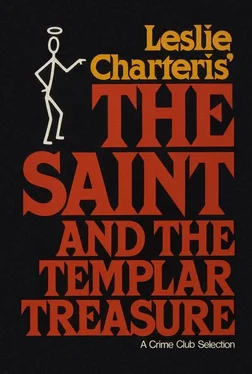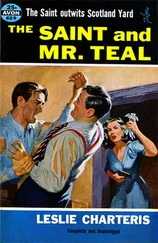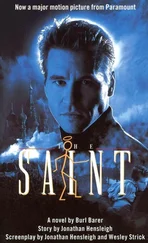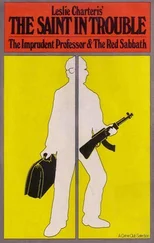He felt a new vitality that came from the prospect of action. In less than an hour Mimette would raise the household and start a search, but instinct told him that by then there would be no need. His imprisonment, he was sure, was only meant to be temporary. Whoever was responsible would return to make quite certain he did not escape, and would come prepared. But not, perhaps, for the reception that the Saint might contrive to arrange.
He allowed himself a few moments to examine the casket. It was more than two feet long and almost a foot high. The metal was almost black, but a section of the lid and front had been cleaned to reveal the pure gleam of silver. In spite of the overall tarnish, it was possible to make out every detail of the embossed figures of knights and horses that formed a frieze around the edge of the lid. It had once been locked by a flap attached to the lid that fitted over a stanchion set halfway down the front and presumably secured by some form of padlock. Now both flap and stanchion were twisted and the lip of the casket was dented.
For such a rich container the contents seemed disappointingly dull. Inside was only a roll of parchment, brown with age and brittle to the touch. Carefully the Saint lifted it out and untied the two leather thongs at each end. He laid it beside the casket and delicately unrolled it until the first three or four inches became visible.
The parchment was so cracked and dark and the letters so faint that he had to strain his eyes to distinguish them. They ran in closely spaced lines without a break or capital to show where one word ended and another began. The last time he had seen such a text it had been in the clear print of a Bible appendix illustrating some of the original source material, with a translation underneath. For the first time since those days he wished he had paid more attention to the schoolmaster who had tried to convince him of the beauty of ancient Greek. Here and there he recognised a word or a short phrase, but not enough to make any sense of the meaning.
Even while he studied the scroll he was listening, alert now for the slightest sound. When he heard it, it was only a faint scrape of stone against stone. It came from the direction of the hole in the ceiling, and told him that someone was opening the improvised trap-door in the chapel.
The Saint moved like lightning. He killed the lamps and padded as swiftly and silently as a ghost across the room. He was already standing against the wall beside the steps when the noise grew louder and a shaft of weak light speared the floor beneath the opening as the flagstone above was removed. He watched as a short ladder was lowered and a pair of legs climbed down.
They brought after them the dwarfish body and gnomish head of Professor Louis Norbert.
The professor stood for a moment regaining his breath, and switched on a flashlight. He directed the beam on to the floor and followed its path towards the plinth. The Saint fell soundlessly into step behind him. As they neared the centre of the crypt, Norbert raised the beam and stopped so abruptly when he saw the open casket that the Saint almost bumped into him.
Judging his moment with the timing of an actor, Simon tapped him on the shoulder.
“Priez Dieu que tous nous vueille absouldre,” he said sepulchrally.
It is physically impossible to jump out of one’s skin, but Louis Norbert made the best attempt that the Saint had ever seen. His whole body jerked so violently that the flashlight flew from his hand. He whirled around but the Saint was no longer there. Simon side-stepped, picked up the torch, and shone it straight into the professor’s ashen face.
“Bon soir, maître. How nice of you to drop in.”
“Templar!” Norbert gasped the name.
“Who were you expecting? Turn around slowly and raise your hands.”
“Why?” Norbert sounded genuinely puzzled.
“Because I’m getting cautious in my old age,” the Saint explained patiently, but with an edge to his voice that told the professor it would be wise to obey.
Norbert did as he was told and the Saint ran an expert hand over him.
“Excuse my suspicions, but one can’t be too careful,” he remarked when he was satisfied that the most dangerous weapon the professor possessed was a fountain pen. “Now let’s have more light on the subject.”
He moved across the crypt and switched on the lamps. He leant against one of the columns and eyed the professor thoughtfully. Norbert was staring at the casket.
“You have been reading the scroll?” he asked.
“I was trying to, but it’s all Greek to me.”
Norbert appeared too relieved to enjoy the joke and was in a hurry to change the subject.
“How did you get in here?”
Simon indicated the locked door.
“Through there. Hecate let me in, and I just followed my nose.”
“You found the tunnel yourself?”
“Purely by luck — but whether it was good or bad remains to be seen,” replied the Saint. He pointed towards the parchment. “What do you know about that piece of antique toilet paper?”
Norbert hesitated as he sought the right reply.
“Nothing much. Why should I?”
It was such an obvious lie that the Saint felt like laughing.
“Couldn’t you understand it?”
Norbert shook his head, and even managed a half-hearted shrug.
“It is too fragile to unroll, without special treatment. And unhappily I am not very versed in ancient Greek. But from the few lines I have seen, it would appear to be a history of Ingare. Interesting in its own way, but no, not important.”
The Saint picked up the parchment. His eyes narrowed.
“A history of Ingare in ancient Greek,” he repeated. “Obviously, not very interesting. So we needn’t bother with it.”
With deliberate slowness he broke off a small corner and let it fall to the floor.
Norbert watched horrified as he prepared to repeat the operation. Suddenly he threw himself forward, clawing for the scroll, but the Saint was waiting for just such a move. He raised the parchment out of Norbert’s reach as he pushed the little man away with the palm of his free hand.
“Well?”
Norbert glared at him in an impotent frenzy.
“I told you, it...”
“Try again.”
The professor looked from the scroll to the Saint and realised that the time for bluff was past. He spoke slowly and distinctly.
“It is the treasure of the Templars.”
Simon laid the parchment back on the marble slab beside the casket, his expression a mixture of perplexity and disbelief.
“This?”
Tenderly Norbert rolled it up, retied the thongs, and put it back in the casket and closed the lid. He turned to face the Saint.
“Yes, that is the treasure. No gold or jewels, but something more priceless than any amount of them,” he announced calmly.
“But what is it?” Simon persisted impatiently.
“I believe...” the professor began and then stopped abruptly. He looked directly at the Saint, and his voice was almost defiant as if he anticipated the response his words would receive. “No, I am sure. It is the Testament of Judas Iscariot.”
The idea seemed so absurd that the Saint could hardly keep a straight face.
“The Gospel according to Judas? You’ll have to do better than that.”
Norbert spread his hands in a gesture of resignation.
“I did not believe it either at first, but I have studied it as best I can. The writing, the parchment, everything can be scientifically dated and verified.”
“But surely Judas gave back the blood money and hanged himself. He didn’t have time to write anything,” Simon protested.
Norbert’s lips curled in a patronising smile.
“You were there? St. Matthew says he hanged himself. In the Acts of the Apostles, it is written that after using the money to buy a field, later given the cursed name of Accidama, he fell down and ‘burst asunder.’ Who knows? When the Gospels were written, and remember that was more than thirty years after the Crucifixion, it would be important to show that the man responsible for Christ’s death had come to a bad end. How could the converts believe in a God that allowed such a man to live? It would have been an impossible question for them to answer.”
Читать дальше












